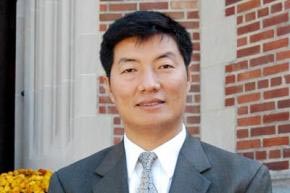
Dr. Lobsang Sangay
Lobsang Sangay was born in 1968 in a Tibetan settlement in Darjeeling, India. He is a Tibetan legal scholar, an expert in international human rights law, and holds a Doctorate in law and LL.M. from Harvard Law School.
“The desire among Tibetans to participate in the civic life of their communities and have a determinant say in the political direction of their government is shared by free peoples around the world,” said Mary Beth Markey, ICT President. “Sadly Tibetan democracy in exile stands in stark contrast with the oppression Tibetans suffer in Tibet where so-called ‘socialist democracy with Chinese characteristics’ means that no direct election for government leaders is allowed.”
The Election Commission of the Central Tibetan Administration announced the results of the popular election for Kalon Tripa (chairman of the Tibetan cabinet) and 44 members of the Tibetan Parliament in Exile from Dharamsala today, April 27, 2011.
The Tibetan exile elections took place on March 20, 2011 in Tibetan communities in India, the United States, Canada, Italy, Switzerland, France, Belgium, Germany, Austria, Poland, Japan, Russia, Taiwan and Australia.
Tibetans living in Kathmandu were denied official permission to vote in the exile elections by the government of Nepal. An election observers’ mission organized by the International Network of Parliamentarians for Tibet and funded in part by the National Endowment for Democracy, visited numerous polling places in North America, Europe and South Asia. Its report, to be released on Friday (April 29), states: “This was the first time that the post of the Head of the Tibetan Central Administration was openly contested. All three remaining candidates, after the preliminary election of 3 October, 2010 were secular and campaigned vigorously for that role. The open campaign for the Kalon Tripa was certainly an element that contributed to the increased information and interest of the Tibetan population on the election process. As a result, an unprecedented number of Tibetan media outlets, associations, NGOs and one political party took an increasingly prominent role in the electoral campaign, organizing dozens of events that were held all over the world where Tibetans live, and that mostly aimed at informing and educating the Tibetan population about the elections.”
Dr. Sangay is expected to take on the administrative responsibilities as the head of the Kashag, the executive body of the Tibetan government in exile, in August 2011. The political responsibilities of the new Kalon Tripa will evolve in relation to the Dalai Lama’s expressed desire to transition away from political leadership as defined by the Charter of the Tibetans in Exile. The new parliament, which will convene in June 2011, will finalize official changes to the Charter to reflect the new political power structure.

